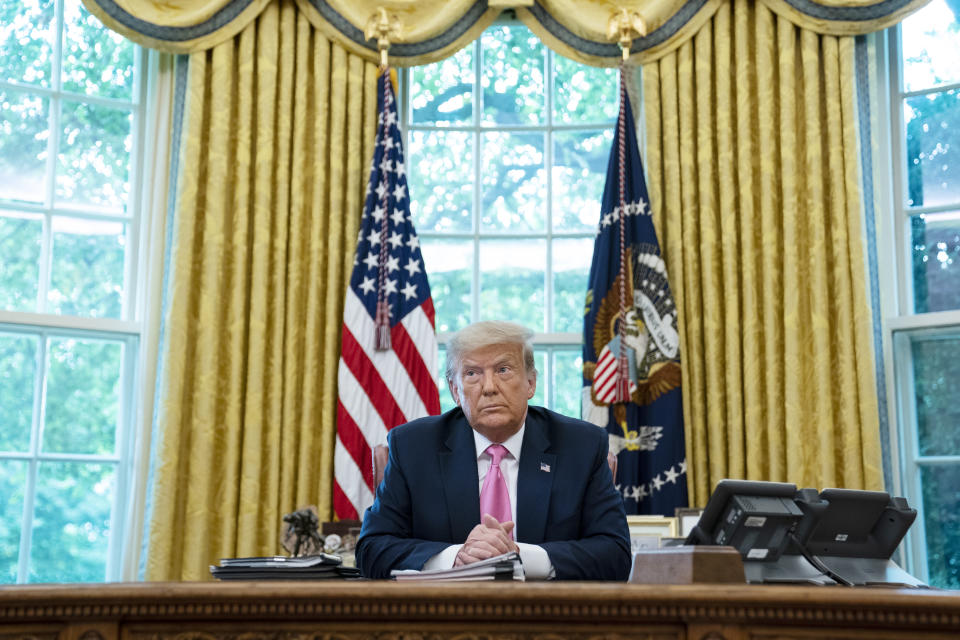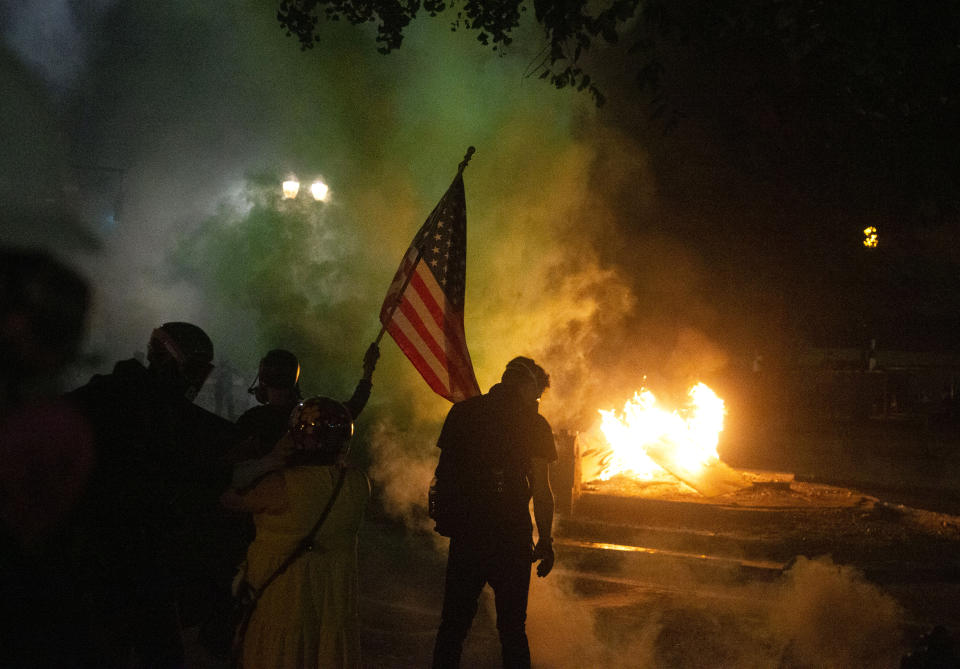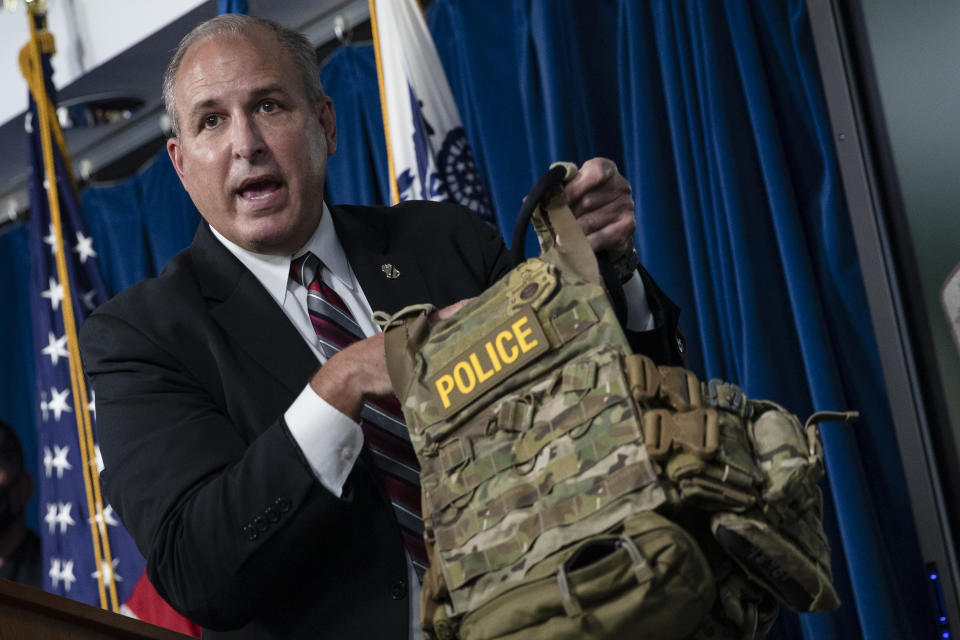Beyond Portland: Can mayors sue Trump to keep out federal police? It's not that simple.
As President Trump prepares to send federal law enforcement officers into America’s largest cities to control civil unrest and street crime, local officials have reacted with alarm and threats of legal action.
Congressional Democrats and even some Republicans have denounced the use of officers in military uniform — but without identification — patrolling streets in Portland, Ore. Many have questioned whether their presence, over the objections of the mayor and governor, is even constitutional.
Is it? If Trump carries out his plans and the mayors of New York, Chicago and other cities sue in response, how are the courts likely to view it?
The bottom line, according to Jonathan Turley, a constitutional law expert and professor at George Washington University, is that local officials have no absolute right to declare federal law enforcement persona non grata in their jurisdiction.
But a lot will depend on what, exactly, the federal officials will be doing.
In the Oval Office on Monday, Trump said his administration is considering sending federal officers to Chicago, New York, Philadelphia and other cities “run by very liberal Democrats” in which crime is increasing and sporadic civil unrest has occurred, prompted by the police killing of George Floyd.
His remarks come as federal law enforcement continues to respond to protests and rioting in Portland, which has seen more than 50 days of demonstrations against police violence, and sporadic vandalism against government buildings, including the federal courthouse. Residents there have accused unidentified officers of picking up residents in unmarked vans and arresting them at random.
Trump has defended the intervention as a necessary action against violent protesters. Now he wants to send federal officers to other cities that he believes are poorly run and out of control.
“How about Chicago? Many people killed over the weekend,” Trump told reporters. “We’re looking at Chicago too. We’re looking at New York. Look at what’s going on. All run by Democrats. All run by very liberal Democrats. All run by radical left. But we can’t let this happen to the cities.”
Local leaders say they won’t let it happen.
“More than once we’ve wondered where this president is trying to take us and whether he’s trying to take away the basic rights of Americans,” New York Mayor Bill de Blasio said Tuesday at a news conference. “And what you see in Portland really makes you worry. New Yorkers are not going to take kindly to anything like that. So I do believe it’s bluster. I do believe we can beat him in court.”
Trump has not divulged the details of his plan, so the basis for any legal challenge is unclear. In the short term at least, law experts say, it will be difficult for mayors to actively prevent him from sending federal law enforcement to their cities.

“This is the flip side of federalism,” Turley told Yahoo News. “Just as the president was wrong in his claims of [states’ lack of authority] on local health matters, these mayors are wrong in their suggestion that they can prevent federal law enforcement from entering the city or making an arrest.”
It was unclear from Monday’s press conference which federal agencies would participate and what their primary responsibilities would be. The Chicago Tribune reported that the U.S. Department of Homeland Security plans to deploy about 150 federal agents to the city this week. The agency has not responded to a request from Yahoo News for comment.
When asked about DHS agents in other cities at a press conference Tuesday, acting Secretary Chad Wolf said the department has teams in Portland and declined to comment on possible action in other cities.
“The department will continue to do our authorized mission in any city across the country,” he said. “You pick any metropolitan city, we have hundreds of officers there, targeting gangs, targeting illicit narcotics. Of course we’re going to come to the assistance of other federal agencies. We’re going to continue to do that.”
Federal law enforcement officers are allowed to protect federal buildings and make arrests in federal crimes, Turley said, and don’t need state or local permission to do so.
“There is no basis for preventing federal agents from entering or patrolling a city,” Turley said. “What [local officials] can do is refuse to engage in a cooperative law enforcement agreement. And that will confine federal agents to federal crimes and the protection of federal property.”
In other words, it would be tough for cities to challenge an enhanced federal presence if federal authorities are enforcing federal law. But federal authorities would not have jurisdiction over local crime matters except as part of a joint effort with local law enforcement.

In a statement to Yahoo News, the Chicago Police Department said it doesn’t maintain any authority over the federal government’s deployment of law enforcement agents to Chicago.
“We regularly work alongside our local and federal law enforcement agency partners toward the common goal of keeping Chicago residents safe,” the department said. “If federal agents are deployed, it is critical that they coordinate with the Chicago Police Department and work alongside us to fight violent crime in Chicago.”
Trump would be hard-pressed, though, to find legal precedent supporting a “huge, unidentified presence” in Portland and other cities, said Michael Greenberger, a law professor and the director of the Center for Health and Homeland Security at the University of Maryland.
“I think what you’re seeing in Portland — it’s not just Immigration coming in and saying, ‘Oh, we’ve got to enforce immigration laws,’” Greenberger said. “But these were people who came in to try and tamp down the protesting as a general matter — arguably not within the statutory functions of immigration officials.”
In an interview with MSNBC’s Joy Reid, Chicago Mayor Lori Lightfoot said she won’t let what’s happening in Portland happen in Chicago.
“What we have [in Portland] is no advance notice to local authorities. No notice to the local U.S. attorney’s office and having these armed camouflage individuals with no insignia on, no nameplates, grabbing people off the street. That’s unconstitutional,” she said Monday. “So our democracy is at stake. And I’ll be darned if I’m going to let anybody, even if their name is Mr. President, bring those kinds of troops to our city and try to take our residents. That’s not going to happen in Chicago.”
Some Republicans have also expressed alarm over DHS actions in Portland, including Tom Ridge, who was the agency’s first administrator. “The department was established to protect America from the ever-present threat of global terrorism. It was not established to be the president’s personal militia,” Ridge said during an interview with Sirius XM host Michael Smerconish.
Michael Chertoff, who led the agency under George W. Bush, told the Washington Post that Trump’s plan is “unsettling” and damaging to the department.
Sen. Rand Paul, R-Ky., a strong Trump backer but one who has occasionally broken with the administration over civil liberties issues, tweeted: “We cannot give up liberty for security. Local law enforcement can and should be handling these situations in our cities but there is no place for federal troops or unidentified federal agents rounding people up at will.”
If agents in other cities engage in the same actions alleged in Portland, local officials could make a valid case that their involvement is unlawful, Greenberger said.
“The 10th Amendment of the Constitution puts the health, welfare and safety of American citizens in the hands of the states, not in the hands of the federal government,” Greenberger said. “[But] there are rare situations where the federal government would intervene.”
Greenberger referred to the Insurrection Act, which allows the president to deploy active-duty military to restore order and peace when there’s a “complete breakdown of law and order,” he said. It’s an exception to federal law that prevents the military from being involved in civilian law enforcement. Several presidents, such as Dwight D. Eisenhower and George H.W. Bush, have invoked the exception to respond to various crises. (The House recently voted to limit the act, The Hill reported.)
What’s reportedly happening in Portland, Greenberger said, does not qualify.
“Officials in Portland, for example, are saying that these were essentially peaceful protests,” he said. “Law and order hadn’t broken down. Yes, it had gone on for many days, but that’s a First Amendment right that’s being exercised. And so what you’re seeing consistently is people saying this smacks of authoritarian conduct, not the conduct of a democratic republic.”

Oregon Attorney General Ellen Rosenblum sued the Department of Homeland Security, U.S. Customs and Border Protection, the U.S. Marshals Service and the Federal Protective Service (which operates under DHS) to restrain the agencies from unlawfully detaining protesters in Portland, according to the complaint filed on July 17.
On Tuesday, Wolf denied reports of unidentified officers detaining protesters, saying the department is using a “targeted approach” to apprehend protesters who are trying to destroy federal property. DHS officials cited federal law that allows DHS and the Federal Protective Service to protect buildings and land occupied by the federal government.
Trump seems to be proposing sending federal law enforcement to quell not just violent protests but violent crime, particularly in Chicago. He has repeatedly denounced the violence in New York, Chicago and other cities, blasting mayors for spiking crime rates.
“I’m going to do something. That I can tell you,” Trump told reporters on Monday. “We’re not going to let this happen in our country.”
But Trump will likely have to be careful with how he proceeds.
“I know of no case involving the Insurrection Act that was predicated on controlling a surge in crime,” Turley said. “In my view, that would not be a proper use of the Insurrection Act. I also believe that the military would resist such a role, as they should. So I’m not convinced that they’re going to use the [act]. I think that the most likely scenario is that they will substantially increase federal law enforcement.”
Turley also said it would be difficult to prosecute federal agents, something Philadelphia District Attorney Larry Krasner said he’d do if officers unlawfully detain individuals there, according to a statement released Monday.
“It’s very rare for federal agents to be criminally liable for unlawful arrest,” Turley said. “It is generally a matter of civil liability. Moreover, federal agents and state officers are protected by immunity. So there’s a robust level of immunity that kicks in when you charge officers with unconstitutional conduct.”
_____
Read more from Yahoo News:
Thumbnail photo: Noah Berger/AP


